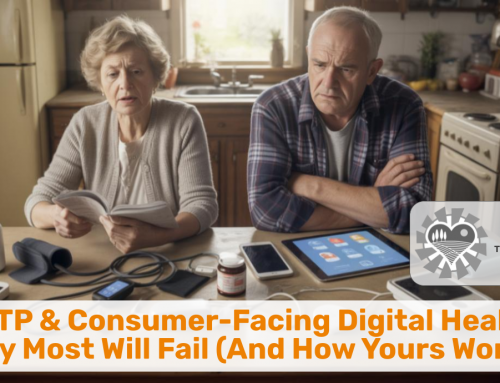Last week I had the great honor of accepting a request to facilitate an international panel of fascinating telehealth innovation experts for the Festival of Telehealth on the topic of “Future Innovation in Telehealth”.
As I was exchanging emails with the panelists where we were presenting our areas of focus and our passions, it struck me how far we’ve come barely one year into the Covid-19 health crisis. Just consider for a moment these five snippets of the illustrious panel including two MDs, a PhD, and two entrepreneurs to truly understand the progress that telehealth is making for healthcare as we speak.
Five Passionate Perspectives
One researcher with a PhD in systems management states that her focus is on “the 4 Ps in innovation: process, product, paradigm, and positioning: [Per my experience] in medical IT and healthcare leadership, the primary focus of the healthcare systems has been on developing technological innovation, whereas innovation in management and processes are still behind the curve in many healthcare organizations.”
Another researcher, from South America, states describes having “concentrated [her] work on developing and implementing technologies that assist in medical care and decision-making, especially in territories where there is no access — or access is precarious — to health.” She continues that she focuses her time on “issues of humanization of new health technologies, providing clear education to the end user about its value (in every sense) and understanding of important concepts that can facilitate technological transitions and make future and inevitable changes less painful for patients who need them.”
The physician, based in the US, emphasized that her focus would be on discussing “the Hospital at Home model using telemedicine, [which ] was recently launched by CMS as part of its Hospital without Walls project to boost the hospital capacity during the pandemic.”
The entrepreneur, originally from the UK and now involved with one South-Asian country’s largest telemedicine service provider writes: “We’ve just delivered our 1,000,000th doctor consultation via video, calls and online chat. And we partner with [large international companies] to serve a very diverse customer base – from rural poor to urban digital-savvy middle class. [Our] recent innovations include: condition management on diabetes via telemedicine; “mobile midwife”: using telemedicine to support healthy births; and women’s and child “digital health centres”: providing specialists via video via rural clinics. Innovations in the context of South Asia focus on the process and management, as much as the service itself.”
And I added as my position that “my passion, when it comes to innovation, is around “accelerating innovation adoption”; as an engineer nothing frustrates me more if needed and well-executed innovation cannot be absorbed by the current healthcare system; it equally irks me to see innovation around solving a problem that actually does not exist.”
The Trojan Horse of Telemedicine
The common theme I see in all five statements is the pragmatic realization that solving the problems that exist in healthcare today are not technical challenges but rather about “people, processes, and management. And technology cannot be created for technology’s sake, but only to solve a clinical problem (“access”, “healthy births”, “specialists”, “boost hospital capacity”).
Yet physicians and administrative hospital leaders are just as prone to fall for the shiny-object syndrome as many other people. We easily fall for the silver bullet solution, the promising technology (Big Data, AI, IoT, Voice) or novel improvement approach (BPE, TQI, Lean, Agile) that will solve it all.



In my mind, I therefore often think of telemedicine as a trojan horse, the mesmerizing gift, the dangling carrot, the shiny object that grabs people’s attention (and allows me into their courtyard). Then, just like my fellow panelists above describe, I surreptitiously apply the principles all of us have laid out in our statements.
The good news is that even if we are coming inside your sacred spaces with the Trojan Horse of telehealth, the only thing we want to “destroy” are obsolete paradigms and the only resistance we want to overcome is that to new, urgently needed new approaches to healthcare delivery.
Our “end in mind” is the quadruple aim of healthcare: lower cost, better outcomes, great services and a satisfied physicians and staff. That’s the true gift within that trojan horse.
Telehealth is Not in Kansas Anymore
Almost a year after the onset of the Covid-19 health crisis, virtual care, telehealth, telemedicine, connected health (or whatever you want to call it), is on every healthcare leaders’ mind. And what we are looking at, what we are aiming for is not the 2019 version of telehealth anymore, driven by some innovative clinical champions and relegated to esoteric, fringe use cases.
No, the pull for the widespread application of telehealth services, like gravity, is inevitable. The realization that to survive, the delivery of care at a distance must be done well, to the satisfaction of the patients and the physicians, is soberingly setting in.
The good news is that the principles that all of us panelists mention in our statements (the 4 Ps….innovation adoption…service, process, management….) are not new to the world of stellar service delivery performance. They have been honed and proven in virtually every other service industry (even banking!).
The Telehealth of 2021 is definitely “not in Kansas anymore”, where we used to hold on to old-fashioned notions of care delivery, such as that patients must come to the physicians, that it’s okay to make patients wait for their care and that the physician ultimately has the best answer.
The telehealth of the third decade in the 21st century will be characterized by the application of proven management and service engineering principles. Still inspired and stimulated by the technical innovations that we collectively are working on across all industries, but skillfully, innovatively applied to ensure that humankind can restore and maintain its greatest asset: health.








To receive articles like these in your Inbox every week, you can subscribe to Christian’s Telehealth Tuesday Newsletter.
Christian Milaster and his team optimize Telehealth Services for health systems and physician practices. Christian is the Founder and President of Ingenium Digital Health Advisors where he and his expert consortium partner with healthcare leaders to enable the delivery of extraordinary care.
Contact Christian by phone or text at 657-464-3648, via email, or video chat.









Leave A Comment